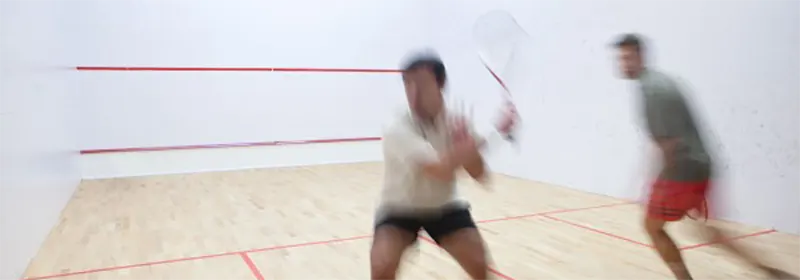29 August 2022 / 3-Min Read / Translate
Firstly, let me clarify what a plateau is in the context of your squash. It's a period of time where you don't seem to improve. Perhaps when you first start to play, it feels that almost every time you step on court you are better than your were the last time. It may feel that within a few weeks, months at most, you'll be beating players who have been playing years. But then reality walks on court with you and slaps you across the face with the harsh truth: IT DOESN'T WORK THAT WAY!
You might have reached your plateau but not noticed yet, or you might have passed one in the past. But it reminds of the say in I.T.: "There are two types of people: those who have lost data and those who will lose data". Meaning eventually everybody loses data. And it's the same with progress plateaus. If you haven't had one yet, don't worry you will.

Progress plateaus happen in all endeavours. Gym goers know that there are times when you just can't seem to lift heavier weights. Now, I don't profess to be a fitness expert, but I do know there is something called "deloading", which is where you use lower weights for a short period of time. This helps break the plateau. Sports that require skill as well as fitness, as opposes to sports that rely 95% of fitness, not only have to take fitness aspects into account, but also technique and tactics.
It's important to note that even if you are training really hard, plateaus can still happen. A plateau is not because you are lazy either. Sometimes it just takes time for your training to show its effect.
Are you expecting change too quickly? Generally, when you first start playing, even small changes to your fitness bring better results, or little changes to your technique or tactics mean you beat people you didn't beat before. As you get better, you need to work longer to effect those changes. They take longer to show themselves. The first plateau most squash players face is going from beginner to improver. For some, that jump can take place within a month, others six months. Sometimes you just have to accept that you are on the plateau and keep doing what you are doing.
You've been patient but now it's time to reassess. One of the hardest things for me as a coach is to decide how long to wait until I change the training. Especially with regard to fitness, but also skill. If you haven't seen a significant improvement in 6 weeks of solid training, then it's time to switch things up. That DOES NOT mean train harder, in fact it might mean a "deload" week, where you ease up on training. Or it might mean trying something new. When I was about 23 or 24 and still had dreams of playing professionally, I vividly remember training with a coach for about 5 weeks, two or three times per week, working really hard each time, plus solo drills and fitness work. I was becoming frustrated that even after all the hard work, I was the same level. Then suddenly, my straight drives were tight, I was quick to the front and had more time; everything seemed to be easier. It took my body AND mind that long for the training to pay off.
Are you training and not just playing? There comes a time, normally about a year after you start playing squash, when only playing is not enough. Up until then, your regular matches were enough time for you to improve. At some point, at one year is just a guide, only playing is NOT enough. You don't HAVE TO start training to improve, but your improvement will come faster if you do. However, there WILL come a day when without training, playing won't be enough.
Are your goals aligned with your training? If you don't have clear goals, you can't create an effective training plan. Did you use your goals as the basis for your training plan or was it more random? For example, if you have decided your fitness is you issue, are you doing the right sort of training and is that training the right thing for your goals?
Are you playing the same people each week? It's time to come out of your comfort zone. It's fun playing the same people each week if the games are close, but it's not the best way to improve. In my 5 Reasons To Play Your First Tournament post, I explain why playing tournament can be a great way to improve.
Consider getting Coaching! No matter how skilled or experienced we are at something, having an outside view and opinion is so important. if you can't seem to improve, no matter what you do, perhaps there is something limiting about your technique or tactics and having coaching my hold the key to your success.
Assuming you have given your training enough time to take effect, if you don't see an improvement, then it's time for a change. Maybe it's time for some different training, maybe it's time to play new players, maybe it's time to have coaching. But something must change. Good Luck!